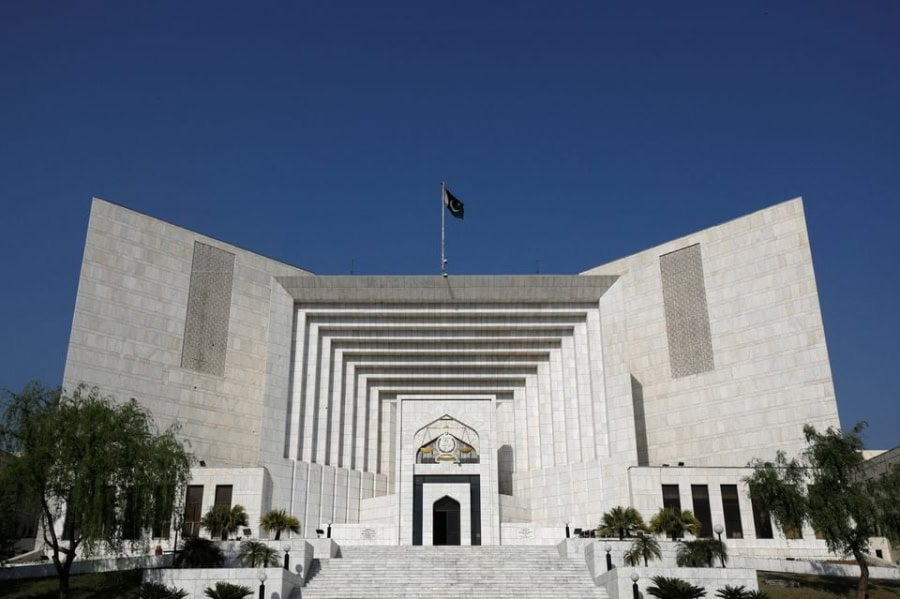ISLAMABAD- The Supreme Court of Pakistan on Saturday formally scheduled an intra-court appeal for hearing against decision regarding amendments in the National Accountability Bureau (NAB) law.
The top court fixed the case for hearing on the request of the federal government and is due to take up the appeal on Tuesday.
A five-member bench headed by Chief Justice of Pakistan Qazi Faez Isa would start hearing of the case. Justice Amin Uddin, Justice Jamal Khan, Justice Athar Minallah and Justice Azhar Rizvi are the other members of the bench.
The apex court also issued notice to the parties in the case on the government’s plea.
The Supreme Court on Friday approved a petition filed by Pakistan Tehreek-e-Insaf (PTI) Chairmran Imran Khan challenging amendments in the National Accountability Bureau (NAB) law.
A three-member bench headed by Chief Justice of Pakistan Umar Ata Bandial and comprising Justice Ijaz ul Ahsan and Justice Mansoor Ali Shah announced verdict with 2-1 majority.
The bench announced the verdict a day before Justice Bandial is set to retire as Pakistan’s top judge on September 17.
The top court invalidated an amendment that bars the graft watchdog from probing cases involving below Rs500 million. It ruled that all cases, which were disposed of by accountability courts as the involving amount was less than Rs500 million, are restored.
An amendment related to plea bargain and seven others have also been declared null and void. The bench ordered the NAB to send record of all cases to courts. However, an amendment related to filing of reference against Service of Pakistan will remain effective.
The verdict was reserved on September 5 after the apex court conducted over 50 hearings in the case.
The landmark ruling reopened the cases against former president Asif Ali Zardari and six ex-prime ministers of the country, including Raja Parvez Ashraf.
The outgoing PDM-led government had approved amendments to the NAB law, including withdrawal of authority to investigate corruption cases of less than Rs500 million. Following the approval of the law, accountability court sent back several cases against top political leaders and public office holders to the NAB.
During previous hearings, the CJP had observed that the top court did not take suo-moto actions as it had learnt lessons from the past. As his retirement was near, the bench would pass an appropriate order in the case before it, he had observed
The chief justice had asked PTI’s lawyer Khawaja Harris that whether he had read the NAB report. The Bureau had narrated the reasons for returning of the references till May. Everything was now on record that whose references had been returned, he added.
CJP Bandial had noted that the first amendment in Section 23 of the NAB law was introduced in May while the second was enacted in June. The references which were returned before May were still with the anti-corruption watchdog, he added.
He had questioned whether there was any provision in the amendments to shift the cases to other forums, observing action must be taken against the crimes including corruption of public assets, smuggling and money laundering. Lack of clarity about such cases in the law was disappointing, he regretted.
It was the state’s responsibility to ensure the public protection and its prosperity, he said, adding a law should be clear.
The CJP asked whether the crimes would be eliminated with the application of the amendments from the past a,d what was the purpose to apply them from the past. As per the amended law a convicted person could seek setting aside his sentence (for corruption) and demand for returning of the money recovered, he observed.
The chief justice asked whether the court could send the matter again to the Parliament to remove weaknesses in the law.
Justice Mansoor Ali Shah said that there was no need of any law for shifting of the cases to the relevant forums. The cases must be sent to any other forums for proceedings, he said.
Makhdoom Ali Khan and PTI chairman’s lawyer Khawaja Harris also gave arguments during the hearing. Later, the bench reserve the verdict.










